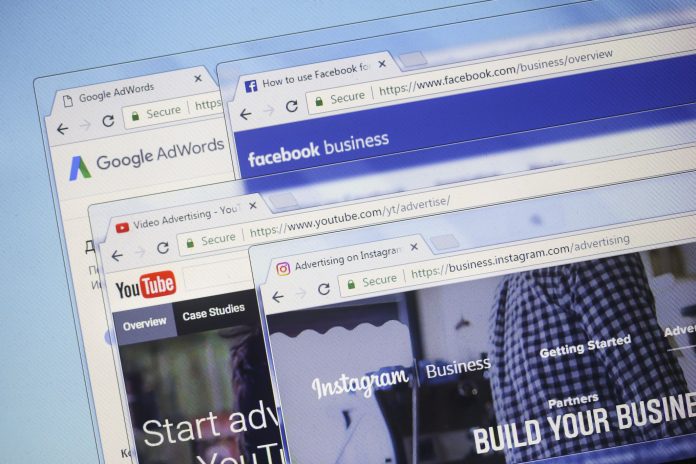The Google division of Alphabet Inc. (GOOGL, GOOG) and the Facebook division of Meta Platforms, Inc. (FB) may be forced to spin off large portions of their online ad businesses, should a new bill pending in the United States Senate eventually become law. The Competition and Transparency in Digital Advertising Act would prohibit companies with more than $20 billion per year in digital ad revenue from running a “digital advertising exchange.”
In the first quarter of 2022 alone, Alphabet generated $68 billion in total revenue, with nearly $55 billion, or 81%, coming from Google’s ad business. The bill thus threatens Alphabet’s primary source of revenue and its business model. Specifically, Google runs an auction, or exchange, where ad transactions are made and prices are set. It also offers tools to assist companies in selling and buying ads. If the new legislation passed, Google would have to choose which of those businesses it would retain. Facebook faces a similar threat.
Although Facebook also may have to divest large portions of its online ad business if the bill passes, Google is its primary target. Critics of Google allege that it engages in monopolistic practices with respect to the market for online ads, thus creating an antitrust issue. These critics find it problematic that Google represents both suppliers and purchasers of online ads, while also conducting real-time auctions that match buyers and sellers and set prices.
In this vein, Senator Mike Lee (R-Utah), the lead sponsor of the bill, stated: "When you have Google simultaneously serving as a seller and a buyer and running an exchange, that gives them an unfair, undue advantage in the marketplace … it can engage in conduct that harms everyone."
Meanwhile, led by Texas, the attorneys general of 16 states and Puerto Rico already have joined in a lawsuit against Google. They accuse the company of controlling the online ad market while also misleading publishers and advertisers about its processing and pricing of ads. Google rejects these allegations as inaccurate and has asked a judge to dismiss the case.
The bipartisan measure is co-sponsored by Senators Mike Lee (R-Utah), Ted Cruz (R-Texas), Amy Klobuchar (D-Minnesota), and Richard Blumenthal (D-Connecticut). A similar bill is expected to be introduced in the U.S. House of Representatives by Representatives Ken Buck (R-Colorado) and Pramila Jayapal (D-Washington). However, it is uncertain that these bills would pass in a midterm election year.
Google spokesperson Julie Tarallo McAlister stated: “Advertising tools from Google and many competitors help American websites and apps fund their content, help businesses grow, and help protect users from privacy risks and misleading ads. Breaking those tools would hurt publishers and advertisers, lower ad quality, and create new privacy risks. And, at a time of heightened inflation, it would handicap small businesses looking for easy and effective ways to grow online.”
Google also says that, should the bill pass, "low-quality data brokers" will flood the internet with "spammy ads." The company asserts that this piece of legislation is the "wrong bill, at the wrong time, aimed at the wrong target."
M. Todd Henderson, a law professor at the University of Chicago, writes that behind the bill is the premise that Google manipulates advertising markets in ways similar to insider trading or front-running in the stock market. He finds no evidence for this.
Rather, he argues: "Google and others revolutionized the market by developing exchanges that held real-time auctions for all available ad space. This process has unleashed countless benefits for both sellers and buyers of ads."
The Software & Information Industry Association (SIIA) released its own critique of the bill. It notes that competition in digital ads is dynamic and that digital advertising makes the "free and open internet" possible. Moreover, it warns that the bill would give consumers fewer and more costly choices.
The SIIA also sees a dangerous trend in a series of recent pieces of legislation that seek to use the "blunt instrument of antitrust law" to punish selected large corporations based on their size, not their conduct. Its statement concludes: "Our nation has long believed in punishing companies for bad behavior, not for their success. That principle should continue to stand in the digital age."
In addition to The Competition and Transparency in Digital Advertising Act, five other pieces of bipartisan legislation have been pending in Congress that target not just Alphabet and Meta but also Amazon.com, Inc. (AMZN) and Apple Inc. (AAPL). These are:
The Software & Information Industry Association (SIIA). "Statement on: The Competition and Transparency in Digital Advertising Act."
CNBC. "New Bipartisan Bill Would Force Google to Break Up Its Ad Business."
CNET. "Bipartisan Bill Would Compel Google to Break Up Its Ad Business."
The Verge. "Senators Push to Break Up Google, Facebook Ads Businesses in New Bill."
The Wall Street Journal. "Don't Try to Regulate Google Ads."
Insider. "Congress Unveils 5 Bipartisan Bills That Mark Its Biggest Step Yet in Regulating Tech Giants Like Amazon, Google, Facebook, and Apple."
Company News
Company News
Company News
Company News
Company News
Company News
When you visit this site, it may store or retrieve information on your browser, mostly in the form of cookies. Cookies collect information about your preferences and your device and are used to make the site work as you expect it to, to understand how you interact with the site, and to show advertisements that are targeted to your interests. You can find out more and change our default settings with Cookie Settings.






